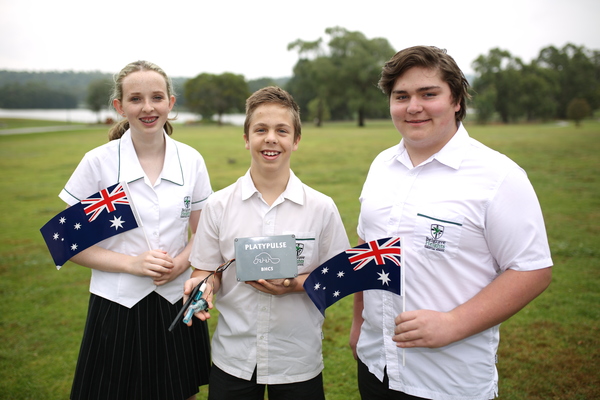By Romy Stephens
A group of students from Belgrave Heights Christan School received the Yarra Ranges Young Environmental Achiever of the Year award for their efforts researching platypus and the local environment.
The Ken Memorial Award was presented to the school’s Platypulse Project Team on 26 January, made up of students Molly, Mitchell, Joshua and Josh.
The four students worked with their teacher, Paul Scott, Melbourne Water and the Yarra Ranges Tech School to develop the Platypulse – a digital sensor that monitors water quality.
The idea behind measuring water quality was to find out why platypus in Monbulk Creek – which borders the school – have moved downstream in recent years.
“Down the back of our school at our creek, there used to be platypus that had recently left and moved on,” Molly said.
“We thought it was because of the water quality so we’re trying to fix that because we know that it had been quite polluted because of some of the schools’ waste.”
The sensor can currently measure turbidity, oxygen and pH, while there are plans to have it measure Phosphate and Nitrate levels in the future.
Allen Dickson runs the robotics program at Belgrave Heights.
He said projects like the Platypulse are “what 21st-century teaching is all about.”
“The great thing is seeing them take the stuff we do in class and put it with a different purpose that’s really cool,” he said.
“They’re seeing real-world application and having to problem solve. They’re having to logically deduce, they’re having to trial and error.
“It ties in two things that the school really values and that is the environmental aspect and these digital technologies.
“It puts the two together which I think is probably my most favourite bit of all.”
During the project, each student specialised in different topics. For example, Molly worked on researching platypus habitats, while Mitchell, Joshua and Josh liaised with Melbourne Water and the Yarra Ranges Council to determine what to look for when measuring water quality.
The four students were in Year 9 when they took on the project. They spent only $350 creating the sensor and did it outside of school hours.
Josh said it was very fulfilling to be recognised for all of their efforts and hard work.
“It feels pretty good that we’re getting an award for what we’ve done because we’ve been doing this for half a year,” he said.
“I’m pretty proud of our team for doing what we did.”
The team will now look to set up a network that allows recordings from the sensor to be transmitted to the Internet.
That way, the sensor can remain in the water and collect data, rather than needing to manually take individual recordings.







